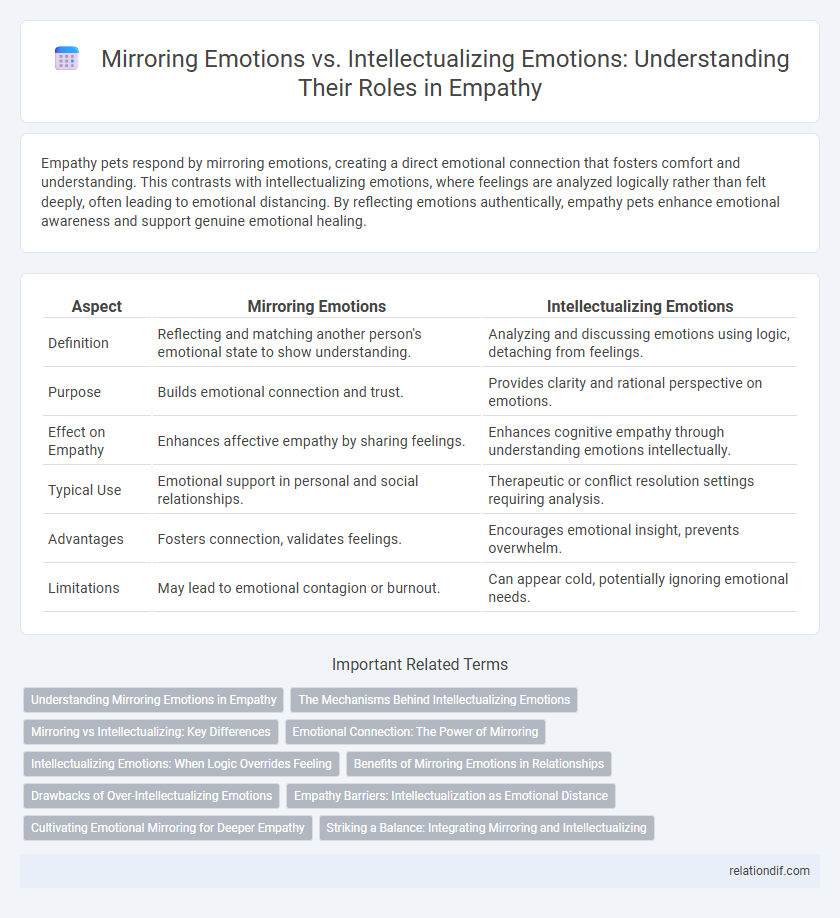Empathy pets respond by mirroring emotions, creating a direct emotional connection that fosters comfort and understanding. This contrasts with intellectualizing emotions, where feelings are analyzed logically rather than felt deeply, often leading to emotional distancing. By reflecting emotions authentically, empathy pets enhance emotional awareness and support genuine emotional healing.
Table of Comparison
| Aspect | Mirroring Emotions | Intellectualizing Emotions |
|---|---|---|
| Definition | Reflecting and matching another person's emotional state to show understanding. | Analyzing and discussing emotions using logic, detaching from feelings. |
| Purpose | Builds emotional connection and trust. | Provides clarity and rational perspective on emotions. |
| Effect on Empathy | Enhances affective empathy by sharing feelings. | Enhances cognitive empathy through understanding emotions intellectually. |
| Typical Use | Emotional support in personal and social relationships. | Therapeutic or conflict resolution settings requiring analysis. |
| Advantages | Fosters connection, validates feelings. | Encourages emotional insight, prevents overwhelm. |
| Limitations | May lead to emotional contagion or burnout. | Can appear cold, potentially ignoring emotional needs. |
Understanding Mirroring Emotions in Empathy
Mirroring emotions involves instinctively reflecting another person's feelings to create an immediate emotional connection, enhancing empathetic understanding on a visceral level. This process engages the brain's mirror neurons, allowing individuals to resonate with the emotional states of others without cognitive analysis. Unlike intellectualizing emotions, which involves detached reasoning, mirroring fosters genuine empathy by directly experiencing and validating others' emotional experiences.
The Mechanisms Behind Intellectualizing Emotions
Intellectualizing emotions activates the brain's prefrontal cortex, allowing individuals to analyze and rationalize feelings rather than directly experiencing them, which contrasts with mirroring emotions that engage the mirror neuron system for empathetic resonance. This cognitive distancing mechanism helps manage emotional distress by breaking down complex feelings into logical components, often reducing immediate emotional intensity. Neuroscientific studies reveal that intellectualization involves increased activity in executive functions, facilitating emotional regulation through thought-based processing instead of affective connection.
Mirroring vs Intellectualizing: Key Differences
Mirroring emotions involves directly reflecting another person's feelings through nonverbal cues, fostering genuine emotional connection and empathy. Intellectualizing emotions, by contrast, engages cognitive processes to analyze or rationalize feelings, often creating distance from the emotional experience. The key difference lies in mirroring's embodiment of shared emotions versus intellectualizing's focus on detached understanding.
Emotional Connection: The Power of Mirroring
Mirroring emotions fosters a deep emotional connection by reflecting and validating another person's feelings, enhancing empathy and trust. This process activates mirror neurons in the brain, naturally synchronizing emotional states and facilitating genuine understanding beyond intellectual analysis. In contrast, intellectualizing emotions can create distance by prioritizing logic over shared emotional experience, reducing the impact of empathetic engagement.
Intellectualizing Emotions: When Logic Overrides Feeling
Intellectualizing emotions involves analyzing feelings through a logical framework, often suppressing genuine emotional experiences to maintain control or avoid vulnerability. This cognitive approach can create a barrier in empathetic connections, as it prioritizes rational understanding over emotional resonance. Balancing intellectual insight with authentic emotional expression enhances empathy by fostering deeper interpersonal understanding and emotional engagement.
Benefits of Mirroring Emotions in Relationships
Mirroring emotions in relationships fosters deep emotional connection by validating partners' feelings and enhancing mutual understanding. This empathetic approach encourages trust, reduces conflict, and promotes emotional safety, allowing both individuals to feel seen and heard. By engaging in emotional mirroring, couples strengthen their bond and support healthier communication patterns.
Drawbacks of Over-Intellectualizing Emotions
Over-intellectualizing emotions can create a disconnect between individuals by prioritizing analytical reasoning over genuine emotional experience, leading to diminished empathy and interpersonal understanding. This approach may cause emotional suppression, resulting in difficulty recognizing and validating both one's own feelings and those of others. Prolonged reliance on intellectualization obstructs emotional processing, ultimately impairing authentic emotional connections and empathy development.
Empathy Barriers: Intellectualization as Emotional Distance
Mirroring emotions fosters genuine connection by reflecting and validating others' feelings, while intellectualizing emotions creates emotional distance through detached analysis. This empathy barrier limits understanding because it prioritizes logic over emotional resonance, hindering authentic relational engagement. Overcoming intellectualization enhances empathetic communication, allowing deeper emotional attunement and trust-building.
Cultivating Emotional Mirroring for Deeper Empathy
Cultivating emotional mirroring enhances empathy by allowing individuals to resonate genuinely with others' feelings, fostering authentic connections that transcend mere intellectual understanding. This process engages mirror neurons, which support shared emotional experiences and improve interpersonal communication. Emotional mirroring encourages recognizing and validating emotions in real-time, leading to deeper empathy and strengthened relational bonds.
Striking a Balance: Integrating Mirroring and Intellectualizing
Striking a balance between mirroring emotions and intellectualizing them enhances empathy by combining emotional resonance with thoughtful understanding. Mirroring emotions allows one to connect deeply with others' feelings, while intellectualizing provides clarity and perspective to navigate complex emotional experiences. Integrating both approaches fosters compassionate responses that are both heartfelt and informed, improving interpersonal communication and emotional intelligence.
Mirroring emotions vs intellectualizing emotions Infographic

 relationdif.com
relationdif.com